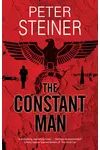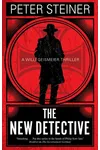Picture a storyteller who sketched one of the internet’s most iconic punchlines and spun gripping mysteries set in the heart of France—meet Peter Steiner! This American cartoonist and novelist, born in Cincinnati in 1940, has left an indelible mark with his wit and words, from the pages of The New Yorker to the Loire Valley’s shadowy intrigues.
Steiner’s life is a tapestry of art, humor, and suspense, weaving together his multicultural roots and sharp observations of human nature. His 1993 cartoon, 'On the Internet, nobody knows you’re a dog,' became a cultural phenomenon, capturing the Wild West days of the web. Meanwhile, his novels, steeped in espionage and historical depth, showcase a storyteller who thrives on both laughter and mystery.
The Making of Peter Steiner
Born to Austrian immigrant parents in Cincinnati, Steiner’s early life was shaped by a blend of Midwestern grit and European sensibility. He studied at the University of Miami, spent a year at the Free University of Berlin, and served in the U.S. Army in Germany. With a Ph.D. in German literature from the University of Pittsburgh, he taught at Dickinson College before trading academia for art. By 1979, his cartoons graced The New Yorker, launching a career that would make him a household name in humor and suspense.
Peter Steiner’s Unforgettable Stories
Steiner’s most famous work isn’t a novel but a cartoon: 'On the Internet, nobody knows you’re a dog,' published in The New Yorker in 1993. This single-panel gem, featuring two dogs at a computer, became the magazine’s most reproduced cartoon, earning Steiner over $200,000 in reprints and a record-breaking $175,000 at auction for the original artwork. Its timeless commentary on internet anonymity still resonates, inspiring plays, memes, and even Apple’s Cyberdog software.
As a novelist, Steiner shines with his Louis Morgon series, featuring a retired CIA agent navigating mysteries in France’s Loire Valley. His debut, A French Country Murder (2003, later Le Crime), blends atmospheric suspense with rich character studies, earning comparisons to Graham Greene and John Le Carré. Follow-ups like L’Assassin (2008), The Terrorist (2010), and The Inconvenient German (2022) explore espionage, morality, and historical intrigue, often with a nod to Steiner’s German roots. His standalone novel, The Good Cop (2019), introduces a new hero tackling a chaotic world, showcasing his knack for crafting flawed, relatable protagonists.
Steiner’s style is a masterclass in duality—his cartoons deliver sharp, instant wit, while his novels unfold slowly, layering psychological depth and historical context. Whether sketching a political jab for the Washington Times or painting vivid scenes in his mysteries, he captures the absurdities and complexities of human behavior with a painter’s eye and a storyteller’s heart.
Why Peter Steiner Matters
Steiner’s impact lies in his ability to bridge humor and suspense, reflecting both the absurdity of modern life and the weight of history. His cartoon defined an era of internet culture, offering a lens on anonymity that’s still relevant today. His novels, meanwhile, invite readers into richly crafted worlds where personal and political conflicts collide, earning praise for their emotional resonance and moral complexity. Living between France and the U.S., Steiner embodies a global perspective that enriches his work, making him a unique voice in both art and literature.
- Born: 1940, Cincinnati, Ohio
- Key Works: 'On the Internet, nobody knows you’re a dog,' A French Country Murder, The Good Cop, The Inconvenient German
- Notable Achievement: Created The New Yorker’s most reproduced cartoon
Ready to dive into Peter Steiner’s world? Snag A French Country Murder for a thrilling mystery or revisit his iconic cartoon for a chuckle that’s still spot-on!








